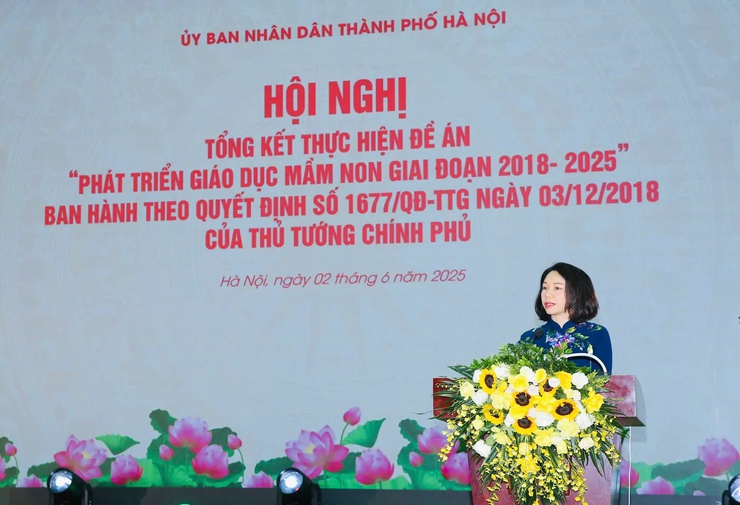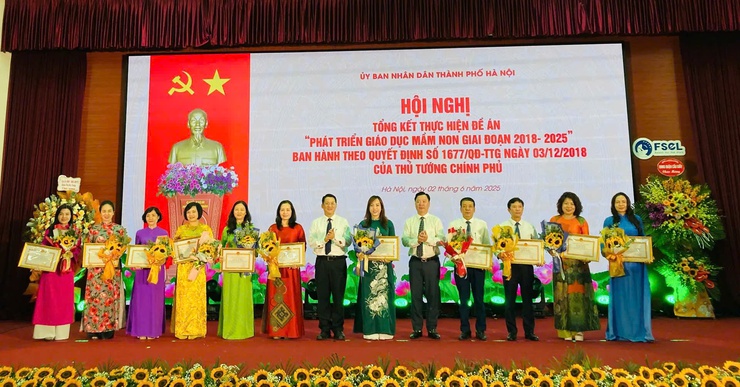Vice Chairman of the Hanoi People's Committee Vu Thu Ha attended the conference, which also saw the participation of representatives from the Vietnam Education Trade Union, senior officials from the Ministry of Education and Training, and leaders from district, county, and town-level People’s Committees. Joining them were heads of several universities, colleges, and vocational schools, as well as principals of kindergartens across Hanoi.

Vice Chairman of the Hanoi People's Committee Vu Thu Ha at the meeting.
According to Tran The Cuong, Director of the Hanoi Department of Education and Training, 100% of the targets were achieved and exceeded. One of the outstanding results during the seven years of implementing the Project "Development of Early Childhood Education for the period 2018-2025" was the synchronous and diverse development of the network of schools and classes.
By 2025, Hanoi is projected to have the largest early childhood education system in the country, with 1,160 kindergartens—accounting for roughly one-tenth of all kindergartens nationwide. Since the launch of the project in 2018, the number of public kindergartens in the capital has increased by 37, while the number of small branch schools has dropped by 307. Additionally, 28 small-scale schools have been merged.
Many localities have effectively streamlined the network of branch schools, notably Thach That and Phu Xuyen districts, each reduced by 21 branch schools; Quoc Oai district reduced by 20 branch schools. The urban districts of Hoan Kiem, Ba Dinh, Hai Ba Trung, and Hoang Mai have successfully merged many small schools.
Some districts such as Thach That, Phuc Tho, Ba Vi, and My Duc have proactively planned large land plots (over 10,000 m² per school) to invest in building standardized kindergartens. This is a strategic solution to improve the quality of early childhood education while developing a synchronized, modern, and sustainable network of schools and classes.
Hanoi is the only locality in the country to develop a high-quality kindergarten model, reflecting the capital's orientation toward innovation, pioneering, and international integration in early childhood education.

Delegates at the event.
Hanoi is also a bright spot in implementing the Project, with the enrollment rate of nursery children exceeding the target by 15.2%, and the enrollment rate of preschool children exceeding the target by 3.6%. The enrollment rate of 5-year-old children in the city reached 100%, affirming the sustainable quality of universal early childhood education for 5-year-olds, laying the foundation toward universal early childhood education for children aged 3 to 5.
The construction of national standard schools has received special attention during this period. To date, the proportion of national standard kindergartens in the city has reached 59.1%, exceeding the target by 9.1%; among which public schools account for 83.6%.
The conference also featured experience sharing from various units on developing high-quality kindergarten models, boosting enrollment rates, enhancing the quality of child care and education, and building national-standard schools.
Recognizing the significant efforts and achievements in early childhood care and education, particularly in the implementation of the “Development of Early Childhood Education for the 2018–2025 period” project, Vice Chairwoman Vu Thu Ha said that Hanoi considers early childhood education a strategic priority and a fundamental pillar in cultivating a high-quality workforce for the future.
During the 2018-2025 period, the city issued many important documents to develop early childhood education, such as the Resolution on policies to support facilities and equipment for independent non-public early childhood education institutions in areas with industrial zones; the Project on training and improving the quality of officials and public employees for the city in the 2022-2025 period; and the plan to implement the roadmap to raise the qualification standards of teachers.
According to Vice Chairman Vu Thu Ha, these major decisions of the city have contributed to clear improvements in infrastructure, the network of schools and classes, as well as the quality of nurturing, caring, and educating children.
The figure of VND62,000 billion (approximately US$2.6 billion) allocated for early childhood education during 2018-2025 also demonstrates Hanoi's special concern for the early childhood generation. While recognizing the outstanding results, Ha acknowledged that early childhood education still faces many difficulties and challenges. Specifically, the enrollment rate of nursery children remains low in some districts; the quality of care, nurturing, and education varies across localities; and there is a localized surplus and shortage of teachers in some districts.
Ha stated that implementing a two-level government system places very high demands on improving comprehensive education quality. The Hanoi education sector needs to thoroughly review all contents and tasks, advise the city in guiding the responsibilities of grassroots government apparatus, especially the proactive role of school principals, ensuring no interruption in work and readiness to meet the demands of the new school year.
She also requested every official and teacher in the capital to demonstrate a pioneering role, contributing to raising the quality of early childhood education in particular and Hanoi's education in general to achieve high and comprehensive results in the near future.